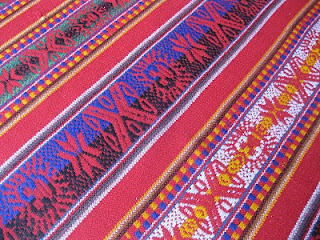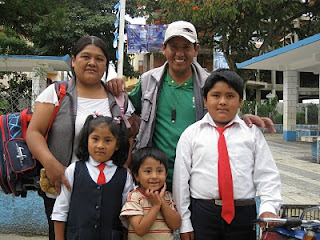A group of UAC-CP alumni and their families gather for a photo yesterday afternoon.
UAC-CP Director Fr. Freddy del Villar also spoke to the group. He told them that as the College approaches its 20th anniversary, it needs to recognize and utilize one of its most valuable resources: its graduates. "It's important that we have you all come back so you can tell your story to our current students. You have been where they are," he continued. He said UAC-CP graduates serve as an example of all the possibilities for young people currently studying in Carmen Pampa.
Fr. Freddy talked about several ways UAC-CP alumni can stay involved. He said graduates can give talks or workshops at the College, they can share news of work or scholarship opportunities that they know about, they can offer internships at their current places of employment, and they can make a financial contribution to the College.
At the reunion, alumni learned about the new scholarship fund, named in honor of Sr. Damon Nolan, that provides a way for former UAC-CP students to give back to the College. While the special fund won't help to subsidize the cost of education, housing, and food, it will directly help students who are unable to pay for minimal costs of tuition and food.
Gladys Rivera, a former UAC-CP Agronomy student who now manages the three food cooperatives at the College, told the group that this type of financial assistance is really essential. She gave her personal testimony to the needs that she encounters on a daily basis as part of her work in Carmen Pampa. "We still have students who don't eat because they don't have the money," she told everyone gathered. By giving back to the UAC-CP, Gladys explained, alumni can help young people surpass the same hurdles and achieve the same dreams that graduates have realized.
Agronomy graduate Sonia Moy and Veterinary Science graduate Darwin Luna work together for CARITAS Coroico, which coordinates social service extension projects.
After the formal presentation, graduates stood up one by one and provided a brief update about their current work and life. They talked about their work in micro finance banks, hospitals, and NGOs. A couple talked about how they've started their own businesses. Many mentioned the mission of the College and how it relates to the work they do now.
Going around the room, graduates peppered their life updates with memories of the College (David Torrez, one of the first to study at the UAC-CP, remembered that there was initially no electricity!). They also gave thanks to Sr. Damon; for her vision to respond to the needs of Bolivia's rural area and her ability to always believe in young people. And they talked about their willingness to make a personal and financial investment in the College. "It seems only right," a graduate told me later, "that I help contribute to a place that changed my life in a really profound way."








































